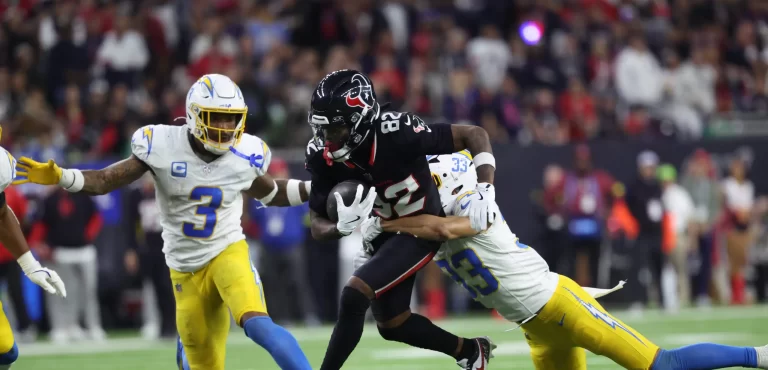The Carolina Panthers have endured their fair share of struggles on the football field over the years, and some of those struggles stem from crucial personnel decisions that never panned out. Among those infamous missteps are the trades involving wide receivers Diontae Johnson and Kelvin Benjamin. These transactions, which seemed promising or at least manageable at the time, have instead become cautionary tales of mismanagement, poor scouting, and the harsh realities of NFL roster building.
In this article, we will take a deep dive into the trades for Diontae Johnson and Kelvin Benjamin, why they turned out disastrously for the Panthers, how these deals have haunted the franchise for years, and why they are frequently cited among the worst trades in NFL history.
Setting the Stage: Carolina Panthers’ Wide Receiver Woes
Wide receivers are often the lifeblood of a potent offense in the NFL, and Carolina’s attempts to secure reliable playmakers at this position have been rocky. The Panthers have struggled to find consistent top-tier wide receivers, oscillating between flashes of promise and prolonged droughts of production.
In that context, the trades for Kelvin Benjamin and later Diontae Johnson were meant to shore up the receiving corps and give the Panthers weapons to compete at the highest level. However, the outcomes were the exact opposite, leaving the franchise worse off and saddling it with the aftermath for years.
Kelvin Benjamin: From First-Round Hope to Trade Bust
The Draft and Early Promise
Kelvin Benjamin was drafted by the Panthers in the first round of the 2014 NFL Draft, 28th overall. Coming out of Florida State, Benjamin was seen as a physically imposing receiver with the size, hands, and contested-catch ability to dominate defenses. The Panthers envisioned him as a go-to weapon for their young quarterback, Cam Newton.
Benjamin’s rookie season showed flashes of that potential. He caught 73 passes for 1,008 yards and nine touchdowns, helping Carolina reach Super Bowl 50. Expectations were sky-high.
The Decline
Unfortunately, Benjamin’s production declined sharply in the following seasons. Injuries, inconsistency, and reported attitude issues plagued his tenure. In 2017, after a disappointing season marred by injuries and a dip in production, the Panthers decided to trade him.
The Trade to Buffalo Bills
In 2018, the Panthers traded Kelvin Benjamin to the Buffalo Bills in exchange for wide receiver Zay Jones and a late-round draft pick. This trade was supposed to refresh the receiving corps and add complementary talent, but it backfired.
- Benjamin’s Impact in Buffalo: He struggled to regain his early-career form, finishing his Bills tenure with underwhelming numbers.
- Zay Jones in Carolina: Jones never blossomed into a reliable option for the Panthers and was eventually released.
Why It Was a Disaster
The Panthers gave up a first-round pick receiver who could have been a foundational piece, only to receive little in return. Benjamin’s inability to rebound after the trade and the lack of meaningful contribution from Zay Jones turned the swap into a loss. The Panthers missed an opportunity to either develop Benjamin or use him as trade capital for better assets.
Diontae Johnson: Another Failed Attempt to Bolster Receiving Talent
The Trade for Diontae Johnson
Fast forward to the 2024 NFL offseason, and the Panthers again found themselves searching for a playmaker at wide receiver. They made a trade for Diontae Johnson from the Pittsburgh Steelers, hoping the versatile and productive receiver would bring stability and consistency.
Diontae Johnson had proven to be a reliable slot receiver in Pittsburgh, combining precise route running, solid hands, and the ability to generate yards after the catch. For Carolina, acquiring Johnson was supposed to signal a step forward.
Immediate Fallout
Instead, the trade quickly soured:
- Johnson’s Performance: Diontae Johnson struggled to adapt to the Panthers’ system, failing to produce anywhere near his prior levels.
- Contract and Cap Implications: The financial burden of Johnson’s contract further hampered Carolina’s cap flexibility.
- Lack of Returns: The draft capital or players Carolina gave up for Johnson did not compensate for the lack of on-field production.
The Trade’s Symbolism
This trade became emblematic of Carolina’s repeated missteps—trading for players with good resumes but questionable fits, leading to no real improvement on the field and creating longer-term roster issues.
The Bigger Picture: How These Trades Haunt the Panthers Today
Lost Draft Capital and Missed Opportunities
Both the Benjamin and Johnson trades involved giving up valuable draft capital or future assets that could have been used to build a more cohesive, talented roster. The Panthers’ inability to leverage those assets wisely has set back the franchise’s rebuild efforts.
Negative Impact on Team Morale and Fanbase
These failed trades have also taken a toll on the morale of the team and its fans. Panthers supporters have grown increasingly frustrated with the front office’s decisions, leading to skepticism about the team’s ability to draft, develop, and trade successfully.
Setting the Team Back Competitively
Instead of gaining immediate offensive weapons to help the team compete, Carolina’s moves left them with roster holes and financial constraints, delaying any meaningful progress.
Comparing to Other NFL Trade Disasters
In NFL history, some trades stand out as exceptionally poor, either because of lopsided player value or the negative long-term impacts on franchises.
- Ryan Leaf for a Draft Pick: The Chargers’ trade involving Ryan Leaf, who became one of the worst draft busts ever.
- Brett Favre Trade: The Packers’ trade of Favre in 2008 shocked fans, though it was more a matter of timing and circumstances.
- JaMarcus Russell Draft: While not a trade, it symbolizes the high cost of poor evaluation.
The Panthers’ trades for Benjamin and Johnson rank in similar conversations, given how they wasted prime opportunities to add difference-makers and set the franchise back years.
Lessons Learned and Future Outlook for Carolina
Emphasizing Draft and Development
The Panthers must recommit to smart draft selections and player development rather than relying heavily on trades to fill gaps. Investing in scouting and analytics could prevent repeated errors.
Caution in Trading Established Talent
Trading away foundational players without clear, high-value returns has proven damaging. Carolina should adopt a more cautious and strategic approach in future trades.
Building a Culture of Patience and Growth
Success in the NFL often comes from patience and culture-building. The Panthers can learn from these mistakes to build a more resilient, successful franchise in the years ahead.
The trades involving Kelvin Benjamin and Diontae Johnson have become two of the darkest chapters in Carolina Panthers history. What were once hopeful moves to bolster the receiving corps instead became symbolically and materially disastrous, haunting the franchise and its fanbase.
These trades exemplify the dangers of mismanagement and highlight how critical smart player evaluation and roster building are in the NFL. While Carolina continues its journey, the lessons from these failed trades must serve as a warning to avoid repeating the costly mistakes that have set back the team’s competitive hopes.

